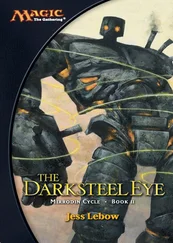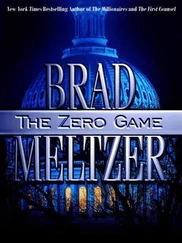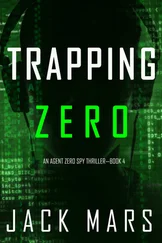An enlargement of Jaguar appeared, even blurrier than the picture from which it was taken. His face was impossible to make out. But it was clear to Remy that the man was older, perhaps in his late fifties or early sixties, and that he was Middle Eastern, with short gray hair. And he was wearing a long, gray wool coat.
“Oh, no,” Remy muttered.
Dave ignored him. “This is Jaguar, the man they refer to as Ibn ’Arabi, an ironic reference to the teaching of Islam as a religion of love. We think Jaguar may have been a professor at one time, and may have taught one or more of the members. We think he may have become radicalized when he lost a family member, perhaps a son, during the first Gulf War, although we don’t know how, or to which side. We also believe he is Americanized, highly educated, with a knowledge of explosives-”
“No, I know that guy,” Remy said.
“Yeah.” Dave sighed and turned to face the fuzzy image of Jaguar. “That’s how I feel.” He walked to the wall and stared into the fuzzy image of the man in the wool coat. “When you finally see the enemy’s face, it’s like you’ve known him your whole life.”
“No-” Remy began.
“Oh, there is… one other consideration,” Dave said slowly, as if searching for the right words. “And it comes from the highest levels, and is not to be repeated outside this room.” He took a breath. “There is some… concern – as I said, at the highest levels – that the perception of danger has…”
“Waned?” Markham said.
“Yes. And we think it’s counterproductive for the public to view our enemies as a bunch of harmless nuts, lunatics with shoe bombs, ineffectual zealots. In other words, we can’t afford to capture a band of unarmed cabdrivers and motel operators.”
Markham looked over and raised his eyebrows, as if this were good news.
“We’re not looking for anything fancy,” Dave said. “It wouldn’t even have to be necessarily operational. But an enemy without weapons is a dog without teeth. So we are not to move until the enemy has an incendiary device.” Dave waited for this to sink in. “And then… we need to move fast.”
And just as Remy was about to stand up and say this was all crazy, Markham burst into nervous, staccato laughter. “It’s a spelling bee with death,” he said. “A hockey game against evil-”
APRIL ANSWERED the door of her apartment and stared coldly at him across the tightened chain. She was wearing jeans and an oxford shirt buttoned over a tank top. Her hair was pulled back in a ponytail. Her face seemed thinner. Pale.
Remy was pleasantly surprised to be there. “Hi,” he said.
She refused to meet his good eye. “What do you want, Brian?”
“What’s the matter?”
“What do you want?”
“What do I want? I… want to see you.”
“Why?”
“To talk.”
“About what?”
Remy was surprised by her iciness. “I miss you.”
“Tell me what you want, Brian.”
“Well…” He wasn’t sure where to start. “I seem to be involved in something and… I don’t know. I need to see you.”
Finally she looked up and seemed to notice the eye patch for the first time. But she didn’t say anything about it. “I’m sure you’ll figure it out,” she said.
“What’s the matter?” he asked again. “Can’t I come in?” He looked past her, into her apartment. The living room was filled with cardboard boxes. Sweaters were stacked on the box closest to the door. “Are you going somewhere, April?”
“Yes,” she said. It felt to Remy that they were speaking too quietly and too quickly, like actors working over a familiar scene. “I’m moving.”
“What? Where?”
“I can’t do this now, Brian.”
“I can’t come in?”
“No,” she said. “You can’t come in.”
“Why?”
“I’m with someone.”
Remy looked past her. “I don’t see anyone.”
“You can’t see ghosts,” she said.
“Ghosts? What are you talking about, April?”
“Please don’t do this,” she said again, staring at the ground.
“Do what?”
“Act like you don’t remember.”
“I don’t remember. I never remember. There are these gaps.”
“Yes,” she said, easing the door shut. “So you’ve said-”
EDGAR LOOKED different – older, more self-assured – although it might have been his haircut. His mop of hair was much shorter, stubble on the sides and a small tuft in front; his old baggy clothes had been replaced by sweatpants and a rain jacket. And physically, he was definitely thicker, as Remy had noticed before, like he’d been lifting weights, his bony neck replaced by a kind of pedestal. Remy was parked along the street again, at dusk, at the top of the hill across from the same mall parking lot. He watched through one lens of the binoculars, traffic cresting the hill, and between the cars he caught glimpses of Edgar walking along the sidewalk. He stopped in the same place as before, hopped over the retaining wall, and dropped again down into the lot. Determined not to lose Edgar this time, Remy took off the binoculars, dropped them on the bench seat, jumped out of the car, and made his way across traffic. He ran down the sidewalk and climbed over the same retaining wall, his patched eye aching as he ran. It was drizzling as Remy dropped over the wall and into the parking lot, twisting his ankle on the five-foot fall. By the time he got back up, he’d lost the boy again.
“Edgar!” The parking lot was landscaped with little tree boxes at the end of every row, and Remy limped his way around cars and sickly trees, rising up on his tiptoes every few minutes to scan the mall for him. “Edgar!”
Groups of people moved along the sidewalks and into the courtyard at the center of the mall. A car honked and Remy got out of its way. He stepped up onto the sidewalk. “Edgar!”
He walked gingerly down the business storefronts, peering in each one: A futon store. A tax preparation business. Maternity clothes. Party supplies. A chiropractor. Rattan imports, golf supplies, tanning beds. He didn’t see his son anywhere, and honestly couldn’t imagine him in any of the stores. “Edgar! Where are you?” Stone ice cream and bagels, Army recruiting and guitar sales and cell phones and…
Remy stopped and stared at the stores he’d passed. He thought about Edgar’s haircut. He walked carefully toward the narrow Army recruiting office. It was a shallow storefront, and it looked as if most of the space was behind a single door. A sergeant with disquieting blue eyes, a thin mustache, and a fading chin was sitting at a desk, talking on the phone. Remy went inside. The sergeant looked up and ended the call.
“Good day, sir,” he said. “What can I do for you?”
Remy looked around. This part of the office was like a false front, a small space with a door leading deeper inside, or maybe to a back exit. “Did my kid come in here?”
“I’m sorry…?” the sergeant said.
“Edgar Remy.” Remy pointed to the door leading to the back of the office. A poster on the door showed the face of a rugged young man wearing fatigues, with smears of black eye paint as if he were simply going to play football. The poster read, ARE YOU READY? “Is Edgar back there?”
The man spoke calmly, reassuringly. “Sir, I’m not at liberty to say who is or isn’t here, except to immediate family.”
“I am immediate family,” Remy said. He moved for the door, but the soldier moved quickly in front of him. They were a few feet apart. “Look, you don’t want him,” Remy said. “He’s just a kid.”
The soldier smiled warmly. “That’s a common reaction when a young man volunteers. It’s hard to acknowledge when a child becomes a man.”
Читать дальше












